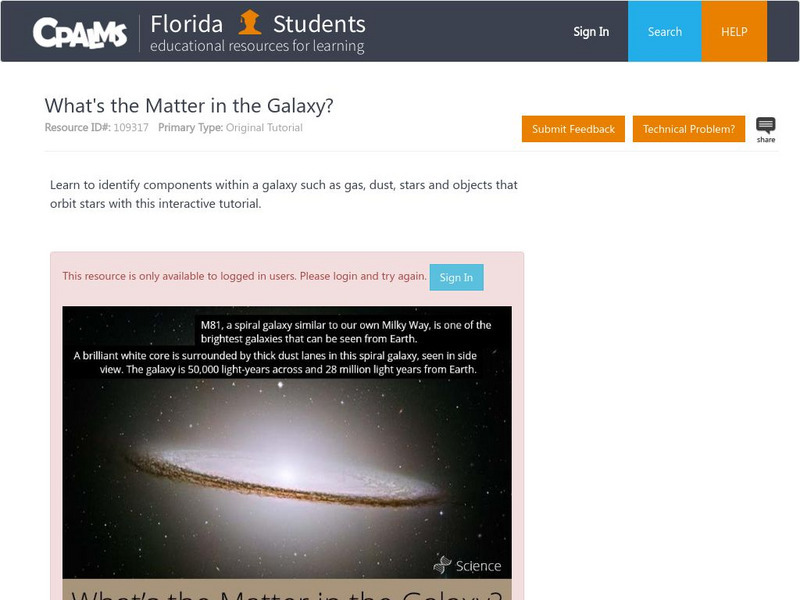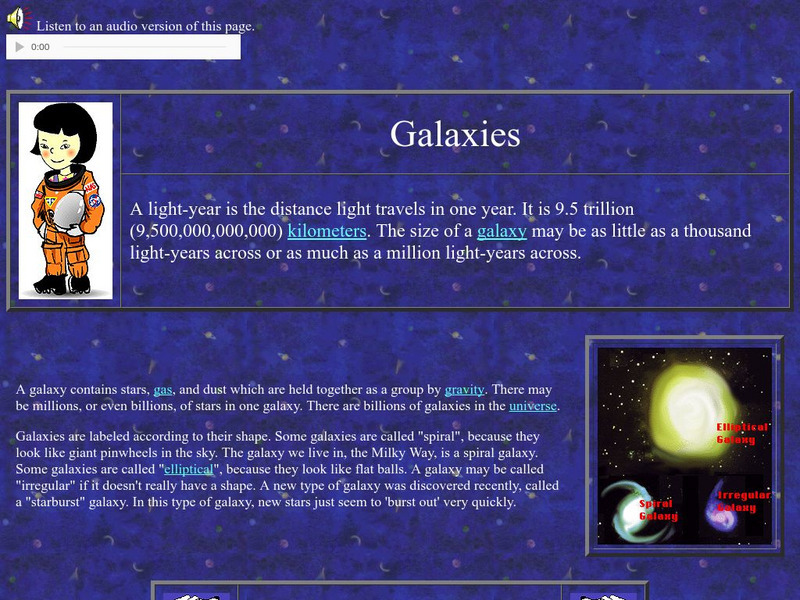Hi, what do you want to do?
Curated OER
Observing the Outer Planets
Students observe the outer planets. In this science lesson, students use a telescope locate the outer planets of the solar system. Students create a video of their observations.
Curated OER
Solar System Multiple Choice Activity
In this solar system worksheet, students complete a ten question multiple choice page pertaining to the solar system. Prior knowledge is assumed.
Curated OER
Solar System Vocabulary 2
In this solar system worksheet, students write vocabulary words describing the solar system next to their definitions. Students write 12 vocabulary words.
Curated OER
Fermi Detects Gamma-Rays from Messier
In this power law function worksheet, students use data from the Fermi Gamma-Ray Space telescope to apply the power law function to physical phenomena. Students use a graph to solve four problems.
Curated OER
Solar System Crossword 2
In this solar system instructional activity, students fill in a crossword that gives them clues about the solar system. Students solve 41 clues for the crossword.
Curated OER
Astronomical Scales
Students describe the different units of measurement. In this space science activity, students calculate astronomical distances using a scale. They explain the significance of using scientific notation in expressing very small or...
Curated OER
Mixed Prepositions
In this interactive prepositions worksheet, students practice using prepositions in sentences. Students choose the correct preposition for each blank in the passage. There are fifteen in all.
Curated OER
Astronomy Class
In this space science worksheet, students find the words associated with the basic terms of Astronomy. The answers are located at the bottom of the page.
Curated OER
Collective Noun
In this collective nouns worksheet, students circle the collective nouns that best completes the 7 sentences. Students then read the sentences that use collective nouns as sentence openers.
Curated OER
The Universe-Scientific Notation Extension
In this scientific notation worksheet, students write a set of 9 average distances in standard form, then complete 3 additional problems. A reference web site is given for additional activities.
Curated OER
Into The Universe
In this space science learning exercise, middle schoolers find the solution to find the different heavenly objects through identifying the pictures.
Curated OER
What is a black hole anyway?
In this black holes learning exercise, students answer multiple choice questions about black holes in space. Students complete 4 multiple choice questions.
Curated OER
The Solar System
In this solar system word puzzle worksheet, students use the 17 clues regarding the solar system to fill in the blanks in the crossword puzzle.
Curated OER
Solar System Crossword
In this solar system learning exercise, learners fill in a crossword that gives them clues about the solar system. Students solve 31 clues for the crossword.
Curated OER
Science: Space Quiz
In this science: space quiz learning exercise, students answer twenty questions, not interactively, about outer space, then scroll down to find the answers.
Curated OER
The Solar System
In this crossword puzzle worksheet, students read the 20 clues about the solar system. Students then complete the puzzle with 20 words related to the solar system.
University of Texas at Austin
The University of Texas Mc Donald Observatory: Stars and Galaxies
Do galaxies collide? Apply concepts of scale to grasp the distances between stars and galaxies.
CPALMS
Florida State University Cpalms: Florida Students: What's the Matter in the Galaxy?
A tutorial that looks at the components within a galaxy such as gas, dust, stars and objects that orbit stars. A PDF file of the tutorial is available.
NASA
Nasa Star Child: Galaxies (Level 1)
This site provides an introduction to galaxies for the younger student, that is divided into 2 levels of understanding. Find out what type of galaxy looks like a giant pinwheel. Audio content included. Good glossary, and a printable...
NASA
Nasa Star Child: Galaxies
This resource has two levels: one for younger viewers and one for older viewers. It surveys the basic galaxy types and provides details.
Other
University of Leicester: Spiral Galaxies
Provides a general overview of spiral galaxies, including descriptions of the different classes of spiral galaxy.
TED Talks
Ted: Ted Ed: Dark Matter: How Does It Explain a Star's Speed?
Video describes how stars move in a spiral galaxy and how their speeds can be explained by accounting for dark matter. [3:17] Includes a brief quiz and a list of additional resources to explore.
Globio
Glossopedia: Stars
Many of the objects you can see in the night sky are stars, large objects in space that produce light. Our galaxy, the Milky Way, contains more than 100 billion stars. Stars are so far away that their light does not reach us for years....
University of Wisconsin
University of Wisconsin: The Constellations and Their Stars
An excellent site dedicated to the constellations and information about the objects which make them up. Contains a great deal of information about various stars, galaxies and other objects, as well as details on how best to observe them.



























